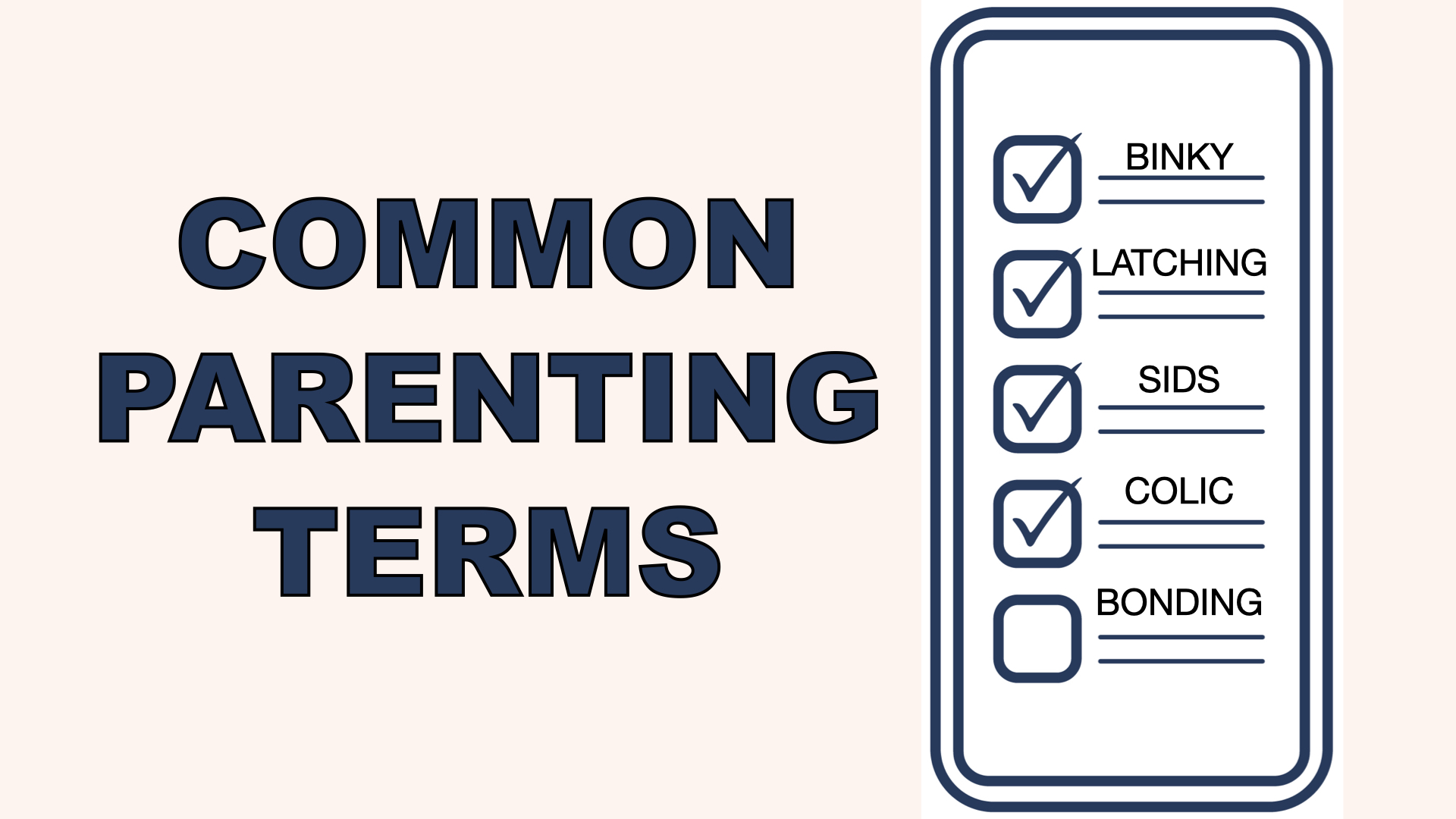Becoming a parent is one of life’s biggest adventures—and like any new adventure, it comes with a whole new language. Whether you’re reading parenting blogs, talking with your pediatrician, or just trying to survive the first few months, it helps to know what people are talking about.
Here’s a handy glossary of parenting terms every new parent should learn. We’ve broken it down by categories so it’s easy to reference when you’re sleep-deprived and wondering what on earth “tummy time” is.
👶 Age & Development Stages
- Newborn – A baby from birth to about 2 months old. This stage is all about feeding, sleeping, and snuggling.
- Infant – Typically refers to a baby between 0–12 months (sometimes up to 18 months). Lots of developmental milestones happen here.
- Baby – General term for a child under 1 year old (similar to Infant)
- Toddler – Ages 1–3, when walking, talking, and tantrums all take off.
- Preschooler – Children aged 3–5, often starting early education programs.
- Milestone – Key developmental events like crawling, walking, or saying “mama.”
- Growth Spurt – A rapid phase of growth that often leads to cluster feeding and extra fussiness.
- Regression – A temporary step backward in development, like sleep or potty training setbacks.
🧸 Gear & Daily Life
- Swaddle – A snug blanket wrap that can help newborns sleep better.
- Bouncer – A soft baby seat that gently moves when baby kicks or wiggles. (not recommended by Baby Physical Therapists)
- Bassinet – A small bed used for newborns, usually placed next to your own.
- Crib – A safe sleeping space for infants and toddlers.
- Stroller – A wheeled device for getting out and about with baby.
- Car Seat – A legally required seat that protects babies and toddlers in the car.
- High Chair – A raised seat for feeding babies once they start solids.
- Diaper Bag – Your portable command center filled with diapers, wipes, bottles, and extra clothes.
- Pacifier (aka Binky) – A rubber or silicone nipple babies suck for comfort.
- Burp Cloth – Cloths used to catch spit-up or drool during feedings.
- Baby Monitor – A device that lets you hear or see your baby when they’re in another room.
- White Noise Machine – A device that plays soothing sounds to help babies sleep.
(See many of these items listed in our Baby Registry Post)
🩺 Health & Medical
- Pediatrician – A doctor who specializes in children’s health.
- Well-Baby Visit – Routine check-ups during baby’s first year to track growth and development.
- Vaccinations – Immunizations given to protect your baby from illnesses.
- Latching – When a baby attaches to the breast for nursing. A good latch = more milk, less pain.
- Tummy Time – Placing baby on their belly while awake to help build neck and core strength.
- Colic – Extended periods of unexplained crying, especially common in the first 3 months.
- Teething – When baby’s teeth start coming in, usually around 6 months. Expect drool and crankiness.
- SIDS (Sudden Infant Death Syndrome) – Unexplained death of a seemingly healthy baby during sleep. Safe sleep practices are essential.
- Fever – A temperature of 100.4°F (38°C) or higher. Call your doctor if your infant has one.
- Spit-Up vs. Vomit – Spit-up is normal and gentle; vomiting is forceful and may signal illness.
(Additional Reads: Diaper Changing 101 along with some Tips for Bathing Your Newborn)
🧠 Emotional & Mental Health
- Postpartum – The period right after childbirth, when recovery (and emotions) run high. Typically lasts 6-8 weeks.
- Baby Blues – Mild, short-term sadness after childbirth. Very common and usually resolves quickly.
- Postpartum Depression – A more serious, longer-lasting form of depression. You’re not alone, and help is available.
- Bonding – The emotional connection that forms between parent and child.
- Attachment – A child’s deep emotional tie to caregivers; essential for healthy development.
- Sleep Deprivation – Welcome to parenthood. Learn to nap when you can.
- Anxiety – Many new parents experience heightened worry, especially in the early days. Talk to a professional if it starts to take over.
🧾 Parenting & Feeding
- Cluster Feeding – When a baby wants to nurse or bottle-feed more frequently, often during growth spurts.
- Dream Feed – Feeding baby while they’re still mostly asleep, usually before the parent goes to bed. (Make sure to have safe sleep habits)
- Babywearing – Carrying baby in a sling or structured carrier to stay hands-free and close.
- Baby-Led Weaning – Letting babies self-feed soft foods instead of purees when starting solids.
- Sleep Training – Teaching your baby to fall asleep on their own. Lots of options and opinions on this one!
- Gentle Parenting – A respectful, empathetic style of parenting focused on connection over control.
- Solids – Solid foods
Final Thoughts
If this list feels like a lot—don’t worry. You don’t need to memorize everything overnight. Parenting is a journey of learning as you go. The important thing is to stay curious, ask questions, and give yourself grace as you adjust to your new role.
Tip: Bookmark this post or print it out for easy reference as things come up.
